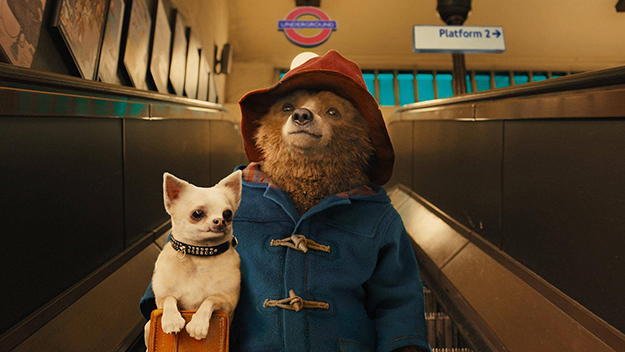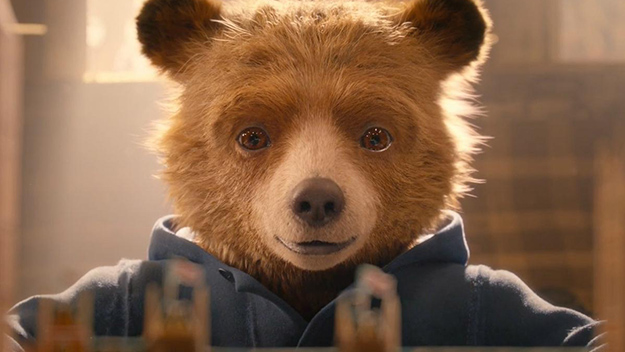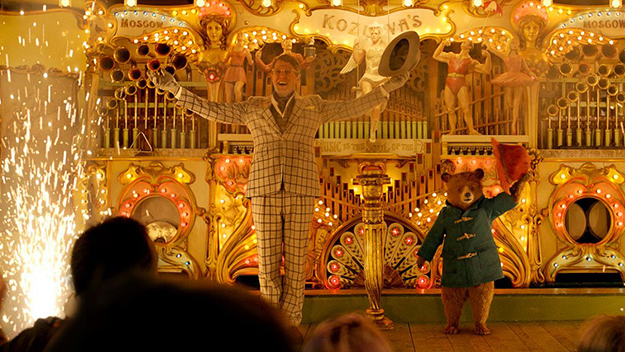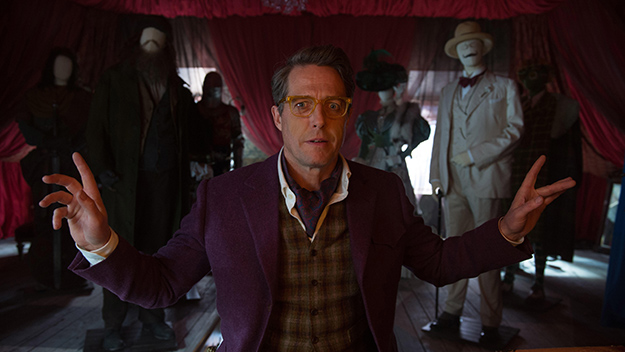Deep Focus: Paddington 2

Is anything as improbable as a “feel-good” movie that actually leaves us feeling terrific? How about two of them in the same series? And what if they’re based on a 150-book literary franchise that had already spawned several animated TV series and a popular stuffed toy? That’s what we talk about when we talk about Paul King’s Paddington movies—the live-action comic exploits of a virtuous young bear from Darkest Peru who resettles in London.
Paddington himself is computer-generated, but so lovingly and imaginatively that we respond to him as to a kid brother. In the hands of King and his team, a panorama of positive emotions pours out from his liquid brown eyes—make that hot liquid eyes, probably from all the tea. The contrast of his overall tenderness to his bloodcurdling “hard stare”—a ferocious and unyielding look that causes even the toughest guys to break into cold sweats—is unfailingly uproarious. So is the delicious fact that he employs it to punish rudeness. Paddington also has what could be called mood fur. Few clown moves could be funnier than watching each strand instantly flare up and out when Paddington touches an electrostatic generator. And to see it crushed under a prison cap makes for infectiously silly and bittersweet vaudeville. This movie functions like family-film burlesque: it uses wholesome words, actions, and images to upend racy jailhouse and caper-film clichés.
Ben Whishaw reprises his disarming voice performance as Paddington. He’s preternaturally gentle yet flexible enough to encompass fleeting bouts of panic and excitability. Just as gracefully and jovially as the first film mixed Paddington’s quest to find a home with Mission: Impossible derring-do and taxidermy espionage, P2 integrates grand larceny and a scavenger/treasure hunt with the bear’s never-say-die struggle to prove his love for his Aunt Lucy. Whishaw’s cuddly-bear grace under pressure, and the ebullience of the returning ensemble, completes the pop perfection.

King casts the members of Paddington’s adopted family with actors who are also wizards of ooohs and ahhs. They’re able to stylize and even parody emotion while keeping it genuine. What a masterstroke to have Sally Hawkins play artist-illustrator and would-be adventurer Mrs. Brown. Hawkins gets to be alternately warm and crackling as an unconventional mother who instinctively connects to Paddington’s innocence and gumption. Hugh Bonneville (the Earl of Grantham in Downton Abbey) sustains an air of rattled sanity and displays a gift for physical comedy as Mr. Brown, a risk-taking risk analyst who tries to overcome a mid-life slump by taking an exercise class in “chakrabatics.” Madeleine Harris as teenage Judy Brown has just the right adolescent edge (she’s embittered after her first romantic breakup), while Samuel Joslin as her slightly younger sibling Jonathan conveys the exhilaration and abashment of an awkward age. And as the family’s distant relative and household drill sergeant, Mrs. Bird, Julie Walters steals scenes with her knowing scowl.
King’s Paddington movies require the bear to achieve an optimistic goal via an eccentric path, with a lot of help from his friends. In Paddington 2 that means purchasing an antique pop-up book of London for the 100th birthday of his Anglophile Aunt Lucy (Imelda Staunton), still living in Peru at the Home for Retired Bears. (He finds this treasure at the shop of Jim Broadbent’s kindly old Central European man, Mr. Gruber, who calls it a “popping book.”) To pay for it, Paddington develops a window washing business—the subject of a sensational slapstick setpiece involving a telescopic ladder, a rope, a flowerpot, and a bucket full of water. It’s superbly ironic that Paddington, who proselytizes for kindness and also embodies fun and spontaneity, repeatedly gets entangled in cords and cables of all kinds. (Another virtuoso comic disaster arises from an encounter with electric clippers in a barbershop.)
King has schooled himself on Chaplin, Keaton, Lloyd, and Langdon as well as contemporary masters like Mel Brooks. This film’s pratfalls and parodies are intricate and (to use Lloyd’s word) speedy, and they set up endearing puns and other verbal gags. In one instance, Paddington gets jailed partly for committing “grievous barberly harm.” The narrative is so beautifully engineered that even apparent throwaway gags boomerang back into the storyline.

The action pivots decisively when a thief runs away with the pop-up book before Paddington can complete the sale. Since King and his cowriters (Hamish McColl on Paddington, Simon Farnaby on P2) conceive the films as a nonstop series of visual and narrative delights and surprises, let’s just say that the authorities blame Paddington for the theft. Prison turns out to be an ideal test for Aunt Lucy’s ruling moral principle, “If you look for the good in people, you’ll always find it.” And it’s yet another triumph for King’s aesthetic principle that dropping Lucy’s cozy wisdom into an incongruous environment will be enjoyably fractious and breezily inspirational. While the bear does his best to make hard time more human (or ursine), the Browns try to solve the crime with Paddington-like combinations of intuition, ingenuity, and luck.
Their prime suspect is Paddington’s direct opposite: Hugh Grant’s sublimely artificial Phoenix Buchanan, a once prominent West End actor who has gone to the dogs, or at least the dog-food commercials. Grant throws himself into the role, giddily emphasizing the phoniness of his trademark put-on charm. Phoenix has grown so self-absorbed that he’ll act only in one-man shows because co-stars would “dilute” his talent. He’s a master of disguise partly because he has no core left to disguise. The filmmakers manage to be generous even toward Phoenix: by the end (and I mean the end credits) they deliver a sweet-and-sour reversal for this sequined husk of a thespian.
Brendan Gleeson does the film’s juiciest acting as the prison chef, Knuckles McGinty—or, as he spells it, “Nuckles”—who comes on as Paddington’s biggest threat and then his sturdiest big-house ally. Blustery and bewhiskered, Gleeson would be perfect as Bluto in a Popeye movie. What’s remarkable about Knuckles and the other cons (the gung-ho actors playing these merry men include Noah Taylor and Aaron Neil) is that they don’t go soft. They redeem themselves partly through illegal acts.

This naughtiness points to the secret of Paddington 2’s success: it embraces goodness without being a goody two-shoes. The movie depicts the Browns’ Windsor Gardens neighborhood as a model of multiculturalism, but there’s nothing sanctimonious about it. And presenting a multiracial and multilingual community is one way of fixing individuals in our minds quickly and efficiently. A single humorous street scene puts across how Paddington improves the existence of Dr. Jafri or Mademoiselle Dupont. So when he disappears behind bars and the ’hood unravels, King can do a complete riff on It’s a Wonderful Life in less than 60 seconds. Paddington himself is more of a melting-pot fellow than a pure multiculturalist. After all, in the first film, it was an English explorer to Darkest Peru who filled Aunt Lucy and Uncle Pastuzo with British reveries and addicted these fine bears (and through them Paddington) to marmalade.
The confectionary colors and toy-like design imbue the film with a vivid airiness. King’s most ambitious flight of fancy is Paddington’s swirling reverie of escorting Aunt Lucy through the pop-up book. Lucy and the cub move through crowds of cardboard cutout people and pigeons and glide from, say, Piccadilly Circus to Trafalgar Square, as the camera never stops twisting and an unseen force turns the pages. The ride is lyrical and haunting—a benign version of Poe’s “All we see or seem / Is but a dream within a dream.” Will that dream become a reality for our hero? Paddington 2 makes us believe in the bear-able lightness of being.
Michael Sragow is a contributing editor to Film Comment and writes its Deep Focus column. He is a member of the National Society of Film Critics and the Los Angeles Film Critics Association, and a programmer at the Criterion Collection.







